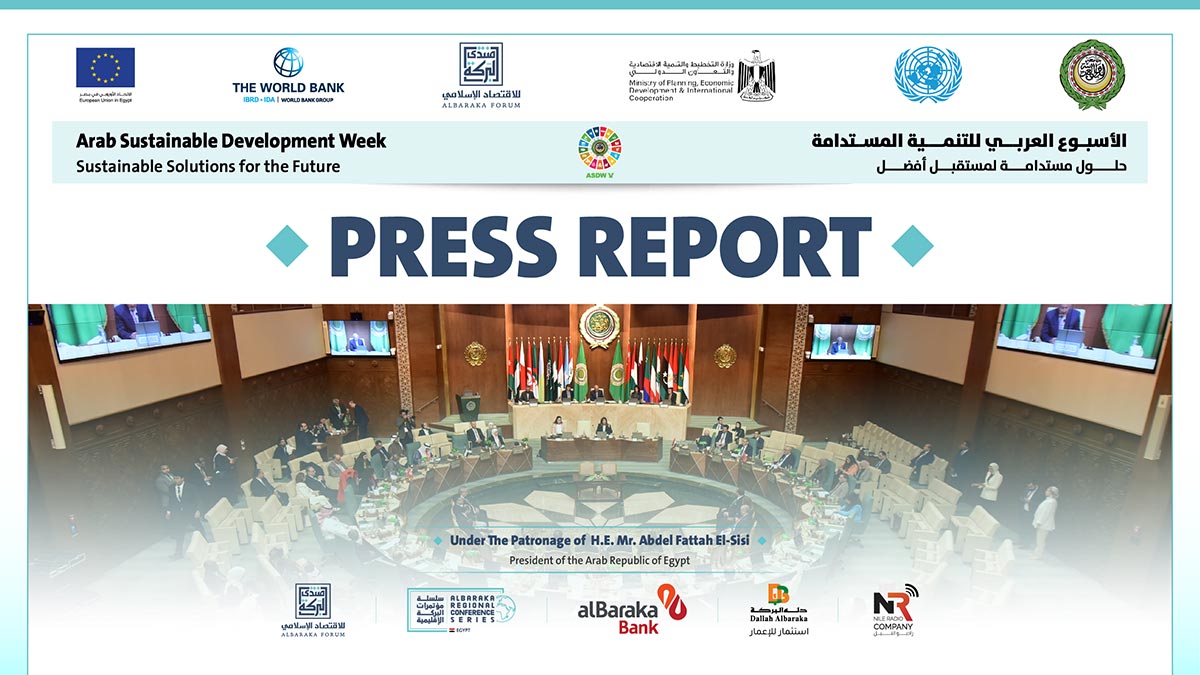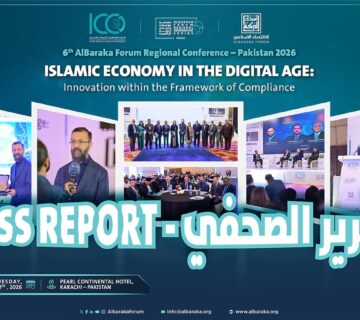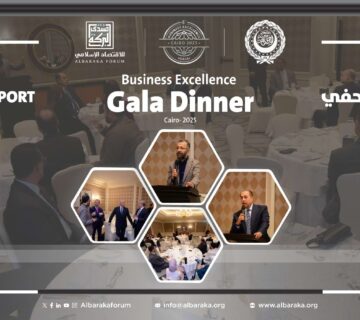Arab Sustainable Development Week Opening
Under the patronage of H.E. Abdel Fattah El-Sisi, President of the Arab Republic of Egypt, the 5th edition of the Arab Sustainable Development Week titled “Sustainable Solutions for the Future: embracing resilience, adaptability, and progress in the ever-evolving Arab world” was launched on 24 November 2024, in strategic partnership between the League of Arab States and AlBaraka Forum for Islamic Economy, as the 3rd AlBaraka regional conference within its activities.
Mrs. Nada El Agizy, Director of the Department for Sustainable Development & International Cooperation, LAS, launched ASDW’s opening ceremony, commending their Excellencies, ambassadors, ministers, governors of Arab central banks, directors of regional, international and Arab organizations, and representatives of the private sector and civil society for responding the invitation to attend this week, explaining the multiplicity and diversity of activities that will be held within its framework, highlighting the efforts and achievements made since the first edition of the week in 2017 until this year’s edition, in light of the challenges, stating that work is still going, to achieve real and tangible sustainable development.
During the session, H.E. Ahmed Aboul Gheit, Secretary General of the League of Arab States pointed out the important significance of this ASDW’s edition title, as most of the period specified for achieving the goals of the 2030 Agenda for Sustainable Development has passed, yet we have not reached a level that satisfies our Arab ambitions. Therefore, the short remaining period requires moving towards enhancing efforts more, while adopting the principles of flexibility and adaptation in the face of difficulties and obstacles that should never break our ambition, his excellency stressed that holding the Arab Sustainable Development Week 2024 gives us the opportunity to work together to draw a roadmap to find flexible practical solutions that will accelerate the pace of implementing sustainable development for the Arab region and have a tangible impact on improving the living conditions of Arab citizens and improving the quality of life in Arab countries.
Followed by the speech of Mr. Stefan Gimbert, Regional Director, Sustainable Development Department, Middle East and North Africa – World Bank, who highlighted the importance of turning strategies into meaningful actions, stating that the World Bank works closely with governments to implement policies that attract investment while ensuring sustainability. Among these efforts is a landmark initiative with the Egyptian government called GROWTH—an ambitious program that stands for Generating Resilience, Opportunities, and Welfare for a Thriving Egypt. Mr. Stefan Gimbert shed light on the critical relationship between climate and development, highlighting the World Bank’s commitment to helping countries shape long-term economic strategies that are green, resilient, and sustainable.
Ms. Elena Panova, Resident Coordinator, Arab Republic of Egypt – United Nations, emphasized the urgent need for transformative approaches to tackle interconnected challenges, including the escalating climate crisis, geopolitical instability, and widening inequalities. She called for collective action, highlighting those shared challenges demand shared responsibility, stating “This gathering today is the demonstration of multilateralism in practice,” emphasizing the importance of addressing the region’s pressing challenges. With the Middle East and North Africa being the only region to experience a reversal in poverty eradication over the last decade, and youth unemployment at 24%—double the global rate—she called for prioritizing investments in poverty eradication, human capital development, and social inclusion.
H.E. Mr. Yousef Hassan Khalawi, Secretary General of AlBaraka Forum for Islamic Economy, emphasized the pivotal role of civil society organizations in building a better future for all, highlighting the growing economic and social challenges, along with emerging crises and natural disasters, which necessitate serious consideration of the future of coming generations, he noted that despite the introduction of concepts such as governance, social responsibility, and sustainable development, the goals of sustainable development remain distant. Debt, economic growth constraints, and demographic crises present new challenges, while inequality stands as a major disgrace of our era, hindering the achievement of the desired sustainability. Furthermore, H.E. Mr. Yousef stressed that AlBaraka Forum does not view its focus on sustainability as a luxury or mere curiosity but as a core concern, based on the vision of its founder, the esteemed entrepreneur Sheikh Saleh Kamel, may Allah have mercy on him, who, five decades ago, introduced the concept of “constructing the earth” and emphasized that the role of business leaders lies in growth and employment, based on his profound understanding of the Holy Qur’an and the Prophetic guidance.
H.E Dr. Rania Al-Mashat, Minister of Planning, Economic Development and International Cooperation of the Arab Republic of Egypt, delivered her speech, praising the occasion of launching the fifth edition of the Arab Sustainable Development Week, held on the land of Egypt, which always welcomes its guests from the brotherly Arab countries and all countries worldwide, to share visions and joint initiatives aimed at formulating innovative development solutions that serve the aspirations of people seeking development towards a better future of safety and prosperity. Highlighting that the Arab Sustainable Development Week has become a prominent regional platform for constructive dialogue between representatives of governments, private sector, civil society, representatives of the women’s, youth and media sectors, as well as universities, and centers specialized in research beside Arab, regional and international organizations that seek to promote cooperation for sustainable development.
Followed by signing a memorandum of understanding (MOU) between H.E. Ambassador Hossam Zaki, Assistant Secretary General of the League of Arab States, representing the LAS, along with H.E. Mr. Yousef Hassan Khalawi, Secretary General, AlBaraka Forum for Islamic Economy, representing AlBaraka Forum.
As an expression of thanks and appreciation, H.E. Mr. Yousef Khalawi, Secretary General of AlBaraka Forum for Islamic Economy presented H.E. Ahmed Aboul Gheit, Secretary General of the League of Arab States, and H.E Dr. Rania Al-Mashat, Minister of Planning, Economic Development and International Cooperation of the Arab Republic of Egypt, AlBaraka Forum’s shield.
The 3rd AlBaraka Summit Regional Conference: First Session
Under the theme “Innovative Strategies for Poverty Alleviation: Integration between Islamic Economy and Sustainable Development”, the 3rd AlBaraka regional conference was launched.
During the opening speech of the 3rd AlBaraka Regional Conference, H.E. Prof. Mohamed El-Dewini, Al Azhar Grand Imam’s Deputy, said that the conference demonstrates the Egyptian state’s commitment to economic and social mobility and that it is eager to achieve the goals of sustainable development. A testament to the interest of the State organs in fighting poverty, is the existence of the National Agenda for Sustainable Development, Egypt’s Vision 2030, which represents a real will stemming from a realistic vision, structured thinking and hope for a vibrant future, praising the importance of this conference, which lies in trying to find complementarities between sustainable development and the Islamic economy with a mission of eradicating poverty by enhancing conversations, understanding and interaction between experts and specialists in the fields of development and Islamic economy.
Followed by launching the high-level 1st discussion panel of the conference, under the title “Achieving Sustainable Development: Economic, Social and Environmental Dimensions in the face of Challenges.”
H.E. Ambassador Hossam Zaki, Assistant Secretary General of the League of Arab States, launched the first session of the 3rd AlBaraka Regional Conference under the title “Innovative Strategies for Poverty Alleviation: Integration between Islamic Economy and Sustainable Development,” declaring that the greatest challenge before us all is eradicating poverty and the need to mobilize all efforts to address it as a guarantee of achieving sustainable development, including working to provide effective financial tools and addressing a number of other issues related to improving the economic situation. During his speech, he mentioned that the League of Arab States had joined the Global Alliance against Hunger and Poverty announced at the recent G-20 summit in Brazil, which is considered the first time to participate in it based on the firm conviction that the first and second sustainable development goals, the fight against hunger and poverty are among the most serious and important goals we are all pursuing.
H.E Dr. Rania Al-Mashat, Minister of Planning, Economic Development and International Cooperation of the Arab Republic of Egypt discussed strategies to stimulate economic growth and achieve comprehensive development policies, highlighting that Egypt’s structural reform programme was built on the 3 pillars which are continuing to promote resilience and macroeconomic stability, a favorable business environment and increased competitiveness, as well as green transformation, declaring that national plans and national financing are complementary to international funding and international programs. She also referred to concessional financing that reduced the cost of financing for the private sector and was one of the most important mechanisms for increasing private sector investment.
Mr. Yasser Sobhy, Deputy Minister of Finance of the Arab Republic of Egypt, emphasized that the Ministry of Finance is working with other ministries to develop high-efficiency programs that reach those in need. He stressed that one of the Ministry’s core roles is to be a partner and supporter of the private sector, recognizing its capacity for innovation, competition, and driving economic growth. To this end, the Ministry has set a primary goal to support the private sector, provide a better environment for it, and launch supportive initiatives, pointing out the opportunities and potential provided by Arab youth innovation, entrepreneurship, and technology development, stressing that these are areas deserving of support. He also highlighted the importance of regional partnerships and free trade agreements, emphasizing the need to diversify financing tools, including Islamic Sukuk. He noted that managing the current economic challenges requires maintaining the sustainability of resources to serve both present and future generations.
Mrs. Margaret Sarofim, Deputy Minister of Social Solidarity of the Arab Republic of Egypt, declared that support, protection, empowerment and development are among the main components of the Ministry of Solidarity. She also pointed out that women and social integration are key pillars of sustainable development through equal opportunities in education, employment and health. She also explained that an online platform has been developed under the name “Tamkeen” to automate the work of economic empowerment programs, which is an important dimension of innovative solutions using technology.
In his speech at the conference, H.E. Mr. Yousef Hassan Khalawi, Secretary General, AlBaraka Forum for Islamic Economy, presented a practical example to demonstrate the huge potential of the Waqf (Islamic endowment) system, explaining that Waqf could be directed in its first year to support the healthcare sector and in its second year to the education sector—two critical fields for addressing poverty. He emphasized that education, in particular, is a decisive factor in shaping the future of individuals. Through this model, Waqf can emerge as a developmental investment institution contributing to sustainable development. H.E. Mr. Khalawi pointed out that despite its vast potential, this model has not yet been implemented, even though it does not place any burden on state institutions or other financial entities. H.E. Mr. Khalawi described this example as a simple application of crowdfunding in service of Waqf. Speaking about the role of Islamic economics in promoting sustainable finance, H.E. Mr. Khalawi pointed out that only a small part of the potential of Islamic economy has been activated so far.
The 3rd AlBaraka Summit Regional Conference: Second Session
Under the title “Financing Sustainable Development: Innovative Strategies to Address the Challenges of Poverty”, the 2nd session of the 3rd AlBaraka Regional Conference launched.
Mr. Wassim El-Metwally Chief Strategy Officer, Sustainability and PMO Director, Al Baraka Bank Egypt, moderated the session, stressing that poverty is one of the biggest challenges facing economic and social development, noting that the current political and economic conditions in the Arab region deepen this challenge and negatively affect social development. He explained that there is an urgent need to change the traditional dialogue approach and explore new financing solutions that can improve poverty rates in the region. Mr. Wassim reviewed reports issued by the World Bank and other international organizations for the year 2024, which revealed that about 130 million people in the Arab region live below the poverty line, which is $2.15 per day. The reports also showed that the region needs about $230 billion annually to achieve the sustainable development goals. He said that these figures, although they reflect the size of the enormous challenges and the large financing gap, they also highlight promising opportunities and the urgent need to enhance cooperation between governments, the private sector, and civil society organizations.
Mr. Bassel Rahmy, Chief Executive Officer MSME Development Agency MSMEDA, highlighted that the Egyptian state is showing interest in the fintech sector beside small, medium and micro enterprises, as not less than 92% of the private sector is under the umbrella of these projects, indicating that technology is the basis for the coming period, as all young people will turn to technology, and this rapid progress must be kept up with, and during his speech, Mr. Bassel Rahmy highlighted what is the Enterprise Development Agency, its role of and responsibility for the coming period, explaining that the agency was established in 1991.
Mr. Nader El Nakib, Chief of Private and Philanthropic Partnerships MENAT at United Nations High Commissioner for Refugees (UNHCR), stressed that humanitarian investment is not just a response to emergencies, but rather a strategic approach that aims to empower refugees and vulnerable communities through projects that achieve economic and social sustainability. highlighting that 70% of displacement cases worldwide in 2024 have been affected by climate change, and that 50% of refugees and displaced persons globally come from OIC member states. He explained that this reality has driven the creation of innovative solutions to expand funding, including the establishment of the Refugee Zakat Fund in 2017, which has become a key initiative to support these vulnerable groups. Additionally, he pointed out the launch of a cash endowment project in partnership with the Islamic Development Bank, which both parties oversee, with the project expected to reach $400 million to assist refugees and displaced persons.
Dr. Sayed Abdel Fadil, Vice President of the Non-Banking Finance Supervision and Control Sector, Financial Regulatory Authority Member of the Egyptian Central Sharia Supervision Committee, reviewed the Authority’s expertise in supporting Islamic finance and how this impacts poverty alleviation, explaining that the Egyptian Financial Regulatory Authority, as an independent body under a constitutional decision, was established as a result of merging four entities: the Real Estate Finance Authority, the Financial Market Supervisory Authority, the Insurance Supervisory Authority, and the Financial Leasing Activity. He added that this authority represents a group of non-banking financial activities that complement the banking financial system, he stressed that the Authority has taken steps to support Islamic finance, starting with the Takaful insurance activity, which is considered one of the oldest activities in this field, to Islamic investment funds, gold funds, and index funds, all of which were present in previous legal frameworks. In 2018, Sukuk Law No. 17 was issued, which created the need for a legislative and Shar’ia framework to regulate Islamic finance.
Concluding the second session of the 3rd AlBaraka Regional Conference, Dr. Moez Al-Shahdi, Founding Member and Chief Executive Officer of the Regional Network of Food Banks, highlighted the impact achieved by the Network of Food Banks for 2023, with the number of monthly feeding of eligible categories unable to gain their living reaching 184 million people while seasonal feeding reached 235 million people, he also elaborated how to enhance the efficiency of geographically distributed associations in countries to achieve those goals for the right categories, and during his speech, Dr. Moez Al-Shahdi declared that to achieve the required goals, we must rely on volunteers, adding that the volunteer database amounts to 827 thousand, classified into age, gender, education, work experience, and locations, which allows to benefit from their competence in serving the required goals, Dr. Moaz also mentioned that the number of able-bodied groups that can be removed from the eligibility database annually reaches 3.5 million.




